2017年大学英语四级翻译复习--茅盾
2017年英语四级翻译答案

长江是亚洲最长、世界上第三长的河流。长江流经多种不同的生态系统,是诸多濒危物种的栖息地,灌溉了中国五分之一的土地。长江流域(river basin)居住着中国三分之一的人口。长江在中国历史、文化和经济上起着很大的作用。长江三角洲(delta)产出多大20%的中国国民生产总值。几千年来,长江一直被用于供水、运输和工业生产。长江上还坐落着世界最大的水电站。
2017年12月
(卷一)
华山位于华阴市,据西安120公里。华山是秦岭的一部分,秦岭不仅分割陕南与陕北,也分隔华南与华北。与从前人们常去朝拜的泰山不同,华山过去很少有人光临,因为上山的道路极其危险。然而,希望长寿大人却经常上山,因为山上生长着许多草药,特别是一些稀有的草药。自上世纪90年代安装缆车以来,参观人数大大增加。
2017年6月
(卷一)
黄河是亚洲第三、世界第六长的河流。“黄”这个字描述的是其河水浑浊的颜色。黄河发源于青海,流经九个省份,最后注入渤海。黄河是中国赖以生存的几条河流之一。黄河流域(river basin)是中国古代文明的诞生地,也是中国早期历史上最繁荣的地区。然而,由于极具破坏力的洪水频发,黄河曾造成多次灾害。在过去几十年里,政府采取了各种措施防止灾害发生。
Huashan(Mount Hua) is situated in Huayin City, 120 kilometers away from Xi'an. It is part of the Qinling Mountains, which divides not only Southern and Northern Shaanxi, but also South and North China. Unlike Taishan, which became a popular place of pilgrimage, Huashan was not well visited in the past because it is dangerous for the climbers to reach its summit. Huashan was also an important place frequented by immortality seekers, as many herbs grow there especially some rare ones. Since the installation of the cable cars in the 1990s, the number of visitors has increased significantly.
2017年英语四级翻译习题及答案
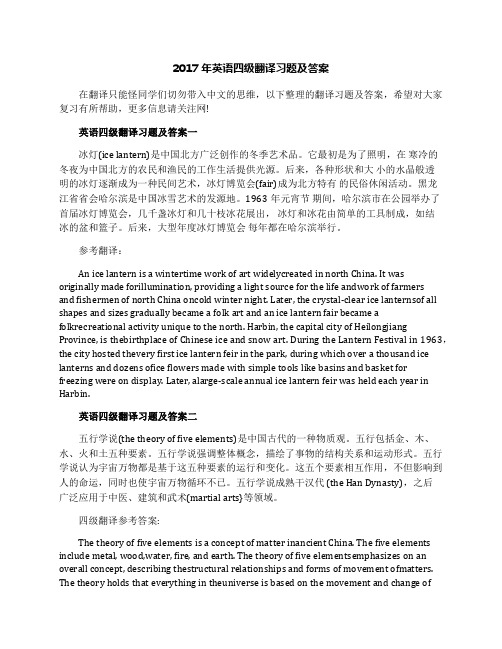
2017年英语四级翻译习题及答案在翻译只能怪同学们切勿带入中文的思维,以下整理的翻译习题及答案,希望对大家复习有所帮助,更多信息请关注网!英语四级翻译习题及答案一冰灯(ice lantern)是中国北方广泛创作的冬季艺术品。
它最初是为了照明,在寒冷的冬夜为中国北方的农民和渔民的工作生活提供光源。
后来,各种形状和大小的水晶般透明的冰灯逐渐成为一种民间艺术,冰灯博览会(fair)成为北方特有的民俗休闲活动。
黑龙江省省会哈尔滨是中国冰雪艺术的发源地。
1963年元宵节期间,哈尔滨市在公园举办了首届冰灯博览会,几千盏冰灯和几十枝冰花展出,冰灯和冰花由简单的工具制成,如结冰的盆和篮子。
后来,大型年度冰灯博览会每年都在哈尔滨举行。
参考翻译:An ice lantern is a wintertime work of art widelycreated in north China. It was originally made forillumination, providing a light source for the life andwork of farmersand fishermen of north China oncold winter night. Later, the crystal-clear ice lanternsof all shapes and sizes gradually became a folk art and an ice lantern fair became a folkrecreational activity unique to the north. Harbin, the capital city of Heilongjiang Province, is thebirthplace of Chinese ice and snow art. During the Lantern Festival in 1963,the city hosted thevery first ice lantern feir in the park, during which over a thousand ice lanterns and dozens ofice flowers made with simple tools like basins and basket for freezing were on display. Later, alarge-scale annual ice lantern feir was held each year in Harbin.英语四级翻译习题及答案二五行学说(the theory of five elements)是中国古代的一种物质观。
2017.12四级翻译
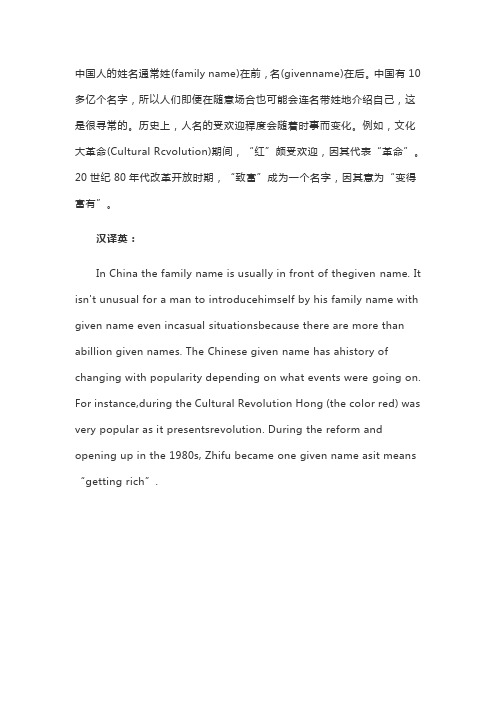
中国人的姓名通常姓(family name)在前,名(givenname)在后。
中国有10多亿个名字,所以人们即便在随意场合也可能会连名带姓地介绍自己,这是很寻常的。
历史上,人名的受欢迎稈度会随着时事而变化。
例如,文化大革命(Cultural Rcvolution)期间,“红”颇受欢迎,因其代表“革命”。
20世纪80年代改革开放时期,“致富”成为一个名字,因其意为“变得富有”。
汉译英:In China the family name is usually in front of thegiven name. It isn't unusual for a man to introducehimself by his family name with given name even incasual situationsbecause there are more than abillion given names. The Chinese given name has ahistory of changing with popularity depending on what events were going on. For instance,during the Cultural Revolution Hong (the color red) was very popular as it presentsrevolution. During the reform and opening up in the 1980s, Zhifu became one given name asit means “getting rich”.这周颁布的一项新法律要求子女必须经常探望年龄超过60岁的父母,并确保他们经济和精神上的需求得到满足。
星期二,新华社报导了_条新闻,来自江苏市无锡市的一位77岁的老太太起诉她的女儿忽略她。
英语四级翻译真题及范文答案2017 12

____年12月大学英语四级考试翻译题目许多人喜欢中餐,在中国,烹饪不仅被视为一种技能,而且也被视为一种艺术。
精心准备的中餐既可口又好看,烹饪技艺和配料在中国各地差别很大。
但好的烹饪都有一个共同点,总是要考虑到颜色、味道、口感和营养(nutrition)。
由于食物对健康至关重要,好的厨师总是努力在谷物、肉类和蔬菜之间取得平衡,所以中餐既味美又健康。
信息技术(Information Technology),正在飞速发展,中国公民也越来越重视信息技术,有些学校甚至将信息技术作为必修课程,对这一现象大家持不同观点。
一部分人认为这是没有必要的,学生就应该学习传统的课程。
另一部分人认为这是应该的,中国就应该与时俱进。
不管怎样,信息技术引起广大人民的重视是一件好事。
你要茶还是咖啡尿是用餐人常被问到的问题,许多西方人会选咖啡,而中国人则会选茶,相传,中国的一位帝王于五千年前发现了茶,并用来治病,在明清(the qing dynasties)期间,茶馆遍布全国,饮茶在六世纪传到日本,但直到18世纪才传到欧美,如今,茶是世界上最流行的饮料(beverage)之一,茶是中国的瑰宝。
也是中国传统和文化的重要组成部分。
Would you like tea or coffee? That's a question people often asked when having meal. Most westerners will choose coffee, while the Chinese would like to choosetea. According to legend, tea was discovered by a Chinese emperor fivethousand years ago, and then was used to cure disease. During the Ming and Qing dynasties, tea houses were all over the country. Tea drinking spread to Japan in the 6th century, but it was not until the 18th century does it spread to Europe and America. Nowadays, tea is one of the most popular beverage in the world, and it is not only the treasure ofChina but also an important part of Chinese tradition and culture.中国结最初是由手工艺人发明的,经过数百年不断的改进,已经成为一种优雅多彩的艺术和工艺。
2017新四级翻译讲解
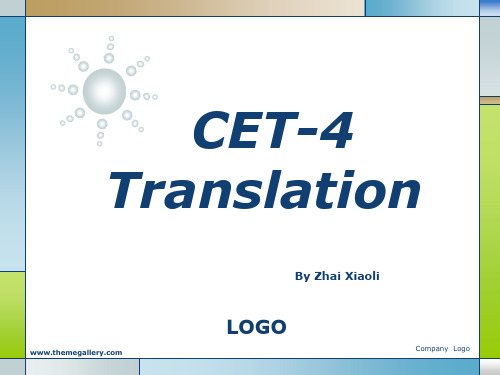
二、汉英翻译技巧
1、词汇层面的处理 2 修饰成分的语序 (1)定语的位置 (2)状语的位置 3 被动语态的翻译 4 倒装结构的翻译
Company Logo
1、词汇层面的处理 选词(一词多意,一意多词) C-E 首先是理解汉语 选词的时候要注意:瞻前顾后,得意忘形 Eg:1问题是到哪儿去找答案 The problem is where to find the answer Eg:2科学家必须知道怎样运用数学以求得问题的 答案 It is necessary that a scientist know how to use mathematics to get an answer to his question
Company Logo
2 修饰成分的语序(定语的语序) 表示时间概念的比较远(前置,后置) 一个白发苍苍的老教授 An old and white-haired professor 国际经济新秩序 A new international economic order 数词较远,表性质的词较近 50多名可爱的孩子 50 lovely children
1.形合与意合 Eg1:我们饿了,我们要吃东西,吃包子,吃饺 子,吃米饭,或者说吃食堂. (动+N )在食堂吃。要对意思解达清楚。 Eg2 :听到这个消息,他满眼都是泪。 When he heard the news, his eyes were filled with tears
Company Logo
2.主语与话题 话题:(话题评论句) 食堂今天吃饺子(我们今天在食堂吃饺子)汉语 字面上的主语不是真正的主语 主语并不一定是我们(他们、老师、学生)因此 用被动。 Jiaozi are served in the canteen today. (tr is not word to word ,)(notion to notion) (汉语里主谓架构的不到50%,大部分是话题加 评述)
2017年英语专业四级翻译练习题及答案1
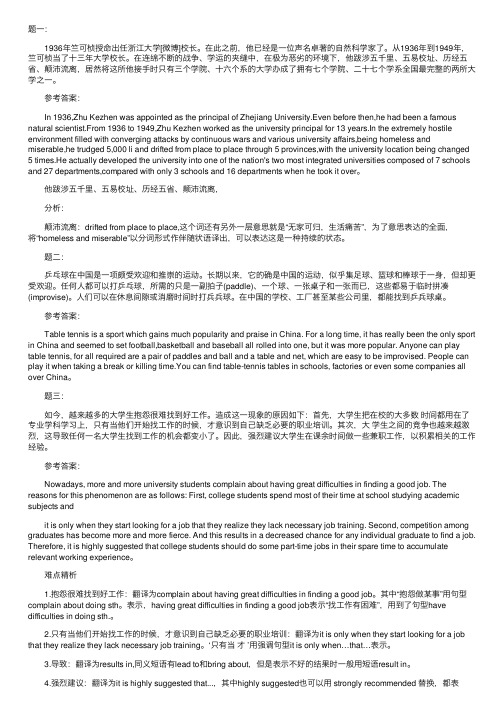
题⼀: 1936年竺可桢授命出任浙江⼤学[微博]校长。
在此之前,他已经是⼀位声名卓著的⾃然科学家了。
从1936年到1949年,竺可桢当了⼗三年⼤学校长。
在连绵不断的战争、学运的夹缝中,在极为恶劣的环境下,他跋涉五千⾥、五易校址、历经五省、颠沛流离,居然将这所他接⼿时只有三个学院、⼗六个系的⼤学办成了拥有七个学院、⼆⼗七个学系全国最完整的两所⼤学之⼀。
参考答案: In 1936,Zhu Kezhen was appointed as the principal of Zhejiang University.Even before then,he had been a famous natural scientist.From 1936 to 1949,Zhu Kezhen worked as the university principal for 13 years.In the extremely hostile environment filled with converging attacks by continuous wars and various university affairs,being homeless and miserable,he trudged 5,000 li and drifted from place to place through 5 provinces,with the university location being changed 5 times.He actually developed the university into one of the nation's two most integrated universities composed of 7 schools and 27 departments,compared with only 3 schools and 16 departments when he took it over。
翻译的基本理论复习题
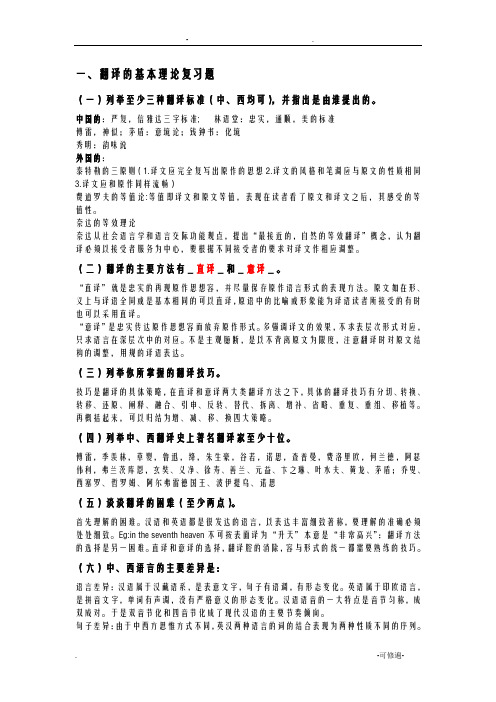
一、翻译的基本理论复习题(一)列举至少三种翻译标准(中、西均可),并指出是由谁提出的。
中国的:严复,信雅达三字标准; 林语堂:忠实,通顺,美的标准傅雷,神似;茅盾:意境论;钱钟书:化境秀明:韵味说外国的:泰特勒的三原则(1.译文应完全复写出原作的思想2.译文的风格和笔调应与原文的性质相同3.译文应和原作同样流畅)费道罗夫的等值论:等值即译文和原文等值,表现在读者看了原文和译文之后,其感受的等值性。
奈达的等效理论奈达从社会语言学和语言交际功能观点,提出“最接近的,自然的等效翻译”概念,认为翻译必须以接受者服务为中心,要根据不同接受者的要求对译文作相应调整。
(二)翻译的主要方法有_直译_和_意译_。
“直译”就是忠实的再现原作思想容,并尽量保存原作语言形式的表现方法。
原文如在形、义上与译语全同或是基本相同的可以直译,原语中的比喻或形象能为译语读者所接受的有时也可以采用直译。
“意译”是忠实传达原作思想容而放弃原作形式。
多强调译文的效果,不求表层次形式对应,只求语言在深层次中的对应。
不是主观臆断,是以不背离原文为限度,注意翻译时对原文结构的调整,用规的译语表达。
(三)列举你所掌握的翻译技巧。
技巧是翻译的具体策略,在直译和意译两大类翻译方法之下,具体的翻译技巧有分切、转换、转移、还原、阐释、融合、引申、反转、替代、拆离、增补、省略、重复、重组、移植等。
再概括起来,可以归结为增、减、移、换四大策略。
(四)列举中、西翻译史上著名翻译家至少十位。
傅雷,季羡林,草婴,鲁迅,绛,朱生豪,谷若,诺思,查普曼,费洛里欧,何兰德,阿瑟伟利,弗兰茨库恩,玄奘、义净、徐寿、善兰、元益、卞之琳、叶水夫、黄龙、茅盾;乔叟、西塞罗、哲罗姆、阿尔弗雷德国王、波伊提乌、诺思(五)谈谈翻译的困难(至少两点)。
首先理解的困难。
汉语和英语都是很发达的语言,以表达丰富细致著称,要理解的准确必须处处细致。
Eg:in the seventh heaven不可按表面译为“升天”本意是“非常高兴”:翻译方法的选择是另一困难。
17年英语四级翻译真题重点词汇

17年英语四级翻译真题重点词汇17年英语四级翻译真题重点词汇立志高远,脚踏实地;刻苦钻研,勤学苦思;稳定心态,不馁不弃;全力以赴,夺取胜利。
以下是店铺为大家搜索整理的17年英语四级翻译真题重点词汇,希望能给大家带来帮助!更多精彩内容请持续关注我们店铺!【乌镇篇】乌镇是浙江的一座古老的水镇,坐落在京杭大运河畔。
这是一处迷人的地方,有许多古桥、中式旅店和餐馆。
在过去一千年里,乌镇的水系和生活方式并未经历多少变化,是一座展现古文明的博物馆。
乌镇所有房屋都是用石木建造。
数百年来,当地人沿着河边建起了住宅和集市。
无数宽敞美丽的庭院藏身于屋舍之间,游客们每到一处都会有惊喜的'发现。
【重点词汇】1.古老的水镇: water-town2.京杭大运河畔: by the bank of Beijing-Hangzhou Grand Canal3.迷人的: charming4.古桥、中式旅店和餐馆: ancient bridges, Chinese-style hotels and restaurants5.在过去一千年里: In the past one thousand years6.水系: water system7.生活方式: way of life8.展现古文明的博物馆: reflect the ancient civilization9.数百年来: For hundreds of years10.无数宽敞美丽的庭院: Countless beautiful spacious courtyards11.屋舍之间: among the houses12.惊喜的发现: have a surprise【功夫篇】功夫(Kung Fu)是中国武术(martial arts)的俗称。
中国武术的起源可以追溯到自卫的需要,狩猎活动以及古代中国的军事训练。
它是中国传统体育运动的一种。
年轻人和老年人都练。
它已逐渐演变成了中国文化的独特元素。
大学英语CET4段落翻译强化训练复习题8篇

大学英语CET4段落翻译强化训练复习题8篇大学英语CET-4段落翻译强化训练复习题8篇【课堂测试将抽取其中1篇,成绩计入1+X 的平时成绩,并计入期终总分】========================================================================CET-4段落翻译强化训练1 长江Part IV Translation (30 minutes) Directions:For this part, you are allowed 30 minutes to translate a passage from Chinese into English. You should write your answer on Answer Sheet 2.翻译原文长江,又名扬子江(the Yangtze River),全长6300千米,是中国第一大河。
长江发源于青藏高原(the Qinghai-Tibet Plateau),流经多个省市。
因富产粮食,长江中下游被称为“中华文明的摇篮”。
长江两岸风景优美,有众多的名胜古迹。
千百年来,长江在农业、工业、运输及战争中发挥着重要的作用。
然而近年来,长江遭受了工业污染和湖泊流失,并由此引发了季节性洪水。
参考答案:The Changjiang River, or the Yangtze River, has a total length of more than 6,000 km. It is the longest river in China and the third longest one in the world. It rises in the Qinghai-Tibet Plateau and flows through many provinces and cities. The middle and lower reaches of the river have been called the cradle of Chinese civilization for their abundance of food produced. Along the two sides of the river is the beautiful scenery with many scenic spots and historical sites. For thousands of years, the river has been playing an important role in agriculture, industry, transportation, and war. But in recent years, the river has suffered from industrial pollution and loss of lakes, which has broughtseasonal floods.CET-4段落翻译强化训练2 铁路翻译原文中国的铁路建设始于清朝(the Qing Dynasty)末年。
2017英语四级翻译真题及参考答案
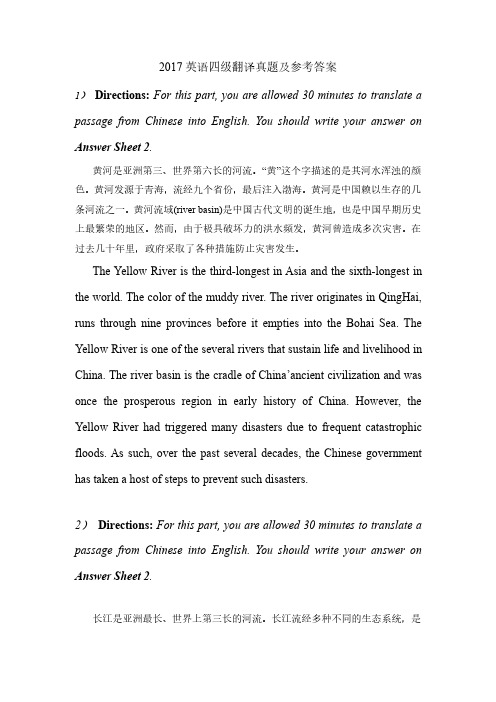
2017英语四级翻译真题及参考答案1)Directions:For this part,you are allowed30minutes to translate a passage from Chinese into English.You should write your answer on Answer Sheet2.黄河是亚洲第三、世界第六长的河流。
“黄”这个字描述的是其河水浑浊的颜色。
黄河发源于青海,流经九个省份,最后注入渤海。
黄河是中国赖以生存的几条河流之一。
黄河流域(river basin)是中国古代文明的诞生地,也是中国早期历史上最繁荣的地区。
然而,由于极具破坏力的洪水频发,黄河曾造成多次灾害。
在过去几十年里,政府采取了各种措施防止灾害发生。
The Yellow River is the third-longest in Asia and the sixth-longest in the world.The color of the muddy river.The river originates in QingHai, runs through nine provinces before it empties into the Bohai Sea.The Yellow River is one of the several rivers that sustain life and livelihood in China.The river basin is the cradle of China’ancient civilization and was once the prosperous region in early history of China.However,the Yellow River had triggered many disasters due to frequent catastrophic floods.As such,over the past several decades,the Chinese government has taken a host of steps to prevent such disasters.2)Directions:For this part,you are allowed30minutes to translate a passage from Chinese into English.You should write your answer on Answer Sheet2.长江是亚洲最长、世界上第三长的河流。
2017年12月四六级翻译题(附答案)
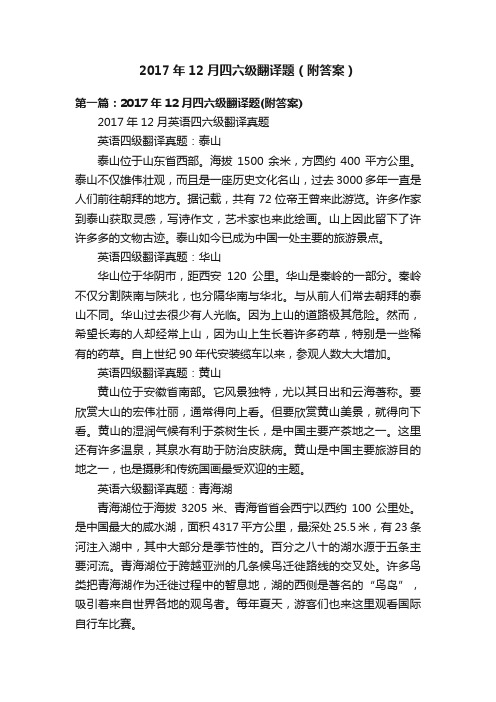
2017年12月四六级翻译题(附答案)第一篇:2017年12月四六级翻译题(附答案)2017年12月英语四六级翻译真题英语四级翻译真题:泰山泰山位于山东省西部。
海拔1500余米,方圆约400平方公里。
泰山不仅雄伟壮观,而且是一座历史文化名山,过去3000多年一直是人们前往朝拜的地方。
据记载,共有72位帝王曾来此游览。
许多作家到泰山获取灵感,写诗作文,艺术家也来此绘画。
山上因此留下了许许多多的文物古迹。
泰山如今已成为中国一处主要的旅游景点。
英语四级翻译真题:华山华山位于华阴市,距西安120公里。
华山是秦岭的一部分。
秦岭不仅分割陕南与陕北,也分隔华南与华北。
与从前人们常去朝拜的泰山不同。
华山过去很少有人光临。
因为上山的道路极其危险。
然而,希望长寿的人却经常上山,因为山上生长着许多药草,特别是一些稀有的药草。
自上世纪90年代安装缆车以来,参观人数大大增加。
英语四级翻译真题:黄山黄山位于安徽省南部。
它风景独特,尤以其日出和云海著称。
要欣赏大山的宏伟壮丽,通常得向上看。
但要欣赏黄山美景,就得向下看。
黄山的湿润气候有利于茶树生长,是中国主要产茶地之一。
这里还有许多温泉,其泉水有助于防治皮肤病。
黄山是中国主要旅游目的地之一,也是摄影和传统国画最受欢迎的主题。
英语六级翻译真题:青海湖青海湖位于海拔3205米、青海省省会西宁以西约100公里处。
是中国最大的咸水湖,面积4317平方公里,最深处25.5米,有23条河注入湖中,其中大部分是季节性的。
百分之八十的湖水源于五条主要河流。
青海湖位于跨越亚洲的几条候鸟迁徙路线的交叉处。
许多鸟类把青海湖作为迁徙过程中的暂息地,湖的西侧是著名的“鸟岛”,吸引着来自世界各地的观鸟者。
每年夏天,游客们也来这里观看国际自行车比赛。
英语六级翻译真题:洞庭湖洞庭湖位于湖南省东北部,面积很大,但湖水很浅。
洞庭湖是长江的蓄洪池,湖的大小很大程度上取决于季节变化,湖北和湖南两省因其与湖的相对位置而得名,湖北意为“湖的北边”,而湖南则为“湖的南边”。
大学英语四级翻译模拟训练及答案
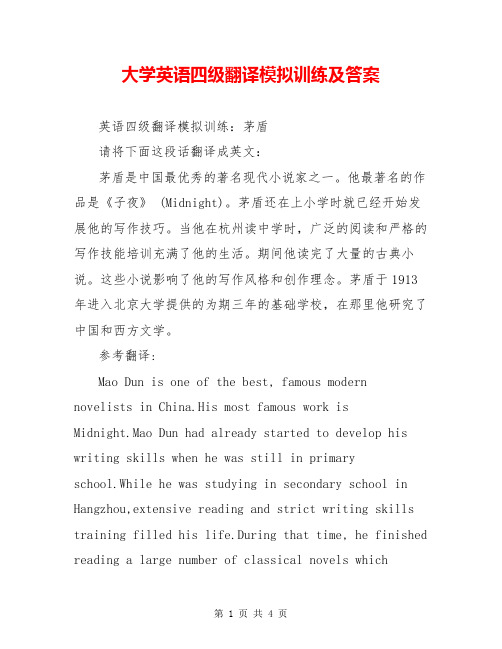
大学英语四级翻译模拟训练及答案英语四级翻译模拟训练:茅盾请将下面这段话翻译成英文:茅盾是中国最优秀的著名现代小说家之一。
他最著名的作品是《子夜》 (Midnight)。
茅盾还在上小学时就已经开始发展他的写作技巧。
当他在杭州读中学时,广泛的阅读和严格的写作技能培训充满了他的生活。
期间他读完了大量的古典小说。
这些小说影响了他的写作风格和创作理念。
茅盾于1913年进入北京大学提供的为期三年的基础学校,在那里他研究了中国和西方文学。
参考翻译:Mao Dun is one of the best, famous modernnovelists in China.His most famous work isMidnight.Mao Dun had already started to develop his writing skills when he was still in primaryschool.While he was studying in secondary school in Hangzhou,extensive reading and strict writing skills training filled his life.During that time, he finished reading a large number of classical novels whichinfluenced his writing style and creating ideas.Mao Dun entered the three-year foundation school offered by Peking University in 1913,in which he studied Chinese and Western literature.翻译详解:1.当他在杭州读中学时,广泛的阅读和严格的写作技能培训充满了他的生活:广泛的可译为extensive, 广泛的阅读为extensive reading。
2017年12月大学英语四级翻译考题训练
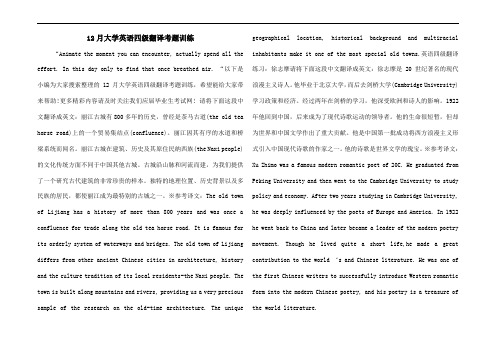
12月大学英语四级翻译考题训练“Animate the moment you can encounter, actually spend all the effort. In this day only to find that once breathed air. “以下是小编为大家搜索整理的12月大学英语四级翻译考题训练,希望能给大家带来帮助!更多精彩内容请及时关注我们应届毕业生考试网! 请将下面这段中文翻译成英文:丽江古城有800多年的历史,曾经是茶马古道(the old tea horse road)上的一个贸易集结点(confluence)。
丽江因其有序的水道和桥梁系统而闻名。
丽江古城在建筑、历史及其原住民纳西族(the Naxi people)的文化传统方面不同于中国其他古城。
古城沿山脉和河流而建,为我们提供了一个研究古代建筑的非常珍贵的样本。
独特的地理位置、历史背景以及多民族的居民,都使丽江成为最特别的古城之一。
※参考译文:The old town of Lijiang has a history of more than 800 years and was once a confluence for trade along the old tea horse road. It is famous for its orderly system of waterways and bridges. The old town of Lijiang differs from other ancient Chinese cities in architecture, history and the culture tradition of its local residents-the Naxi people. The town is built along mountains and rivers, providing us a very precious sample of the research on the old-time architecture. The unique geographical location, historical background and multiracial inhabitants make it one of the most special old towns.英语四级翻译练习:徐志摩请将下面这段中文翻译成英文:徐志摩是20世纪著名的现代浪漫主义诗人。
2017大学英语四级翻译模拟题含答案
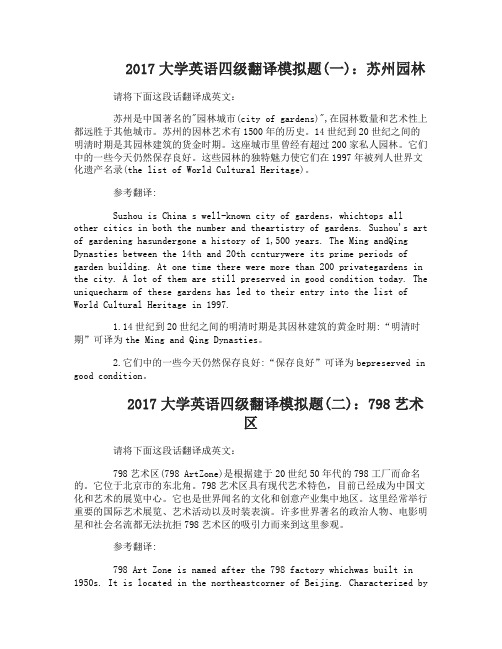
2017大学英语四级翻译模拟题(一):苏州园林请将下面这段话翻译成英文:苏州是中国著名的"园林城市(city of gardens)",在园林数量和艺术性上都远胜于其他城市。
苏州的因林艺术有1500年的历史。
14世纪到20世纪之间的明淸时期是其园林建筑的货金时期。
这座城市里曾经有超过200家私人园林。
它们中的一些今天仍然保存良好。
这些园林的独特魅力使它们在1997年被列人世界文化遗产名录(the list of World Cultural Heritage)。
参考翻译:Suzhou is China s well-known city of gardens,whichtops all other citics in both the number and theartistry of gardens. Suzhou's art of gardening hasundergone a history of 1,500 years. The Ming andQing Dynasties between the 14th and 20th ccnturywere its prime periods of garden building. At one time there were more than 200 privategardens in the city. A lot of them are still preserved in good condition today. The uniquecharm of these gardens has led to their entry into the list of World Cultural Heritage in 1997.1.14世纪到20世纪之间的明清时期是其因林建筑的黄金时期:“明清时期”可译为the Ming and Qing Dynasties。
2017四级辅导---翻译(1)
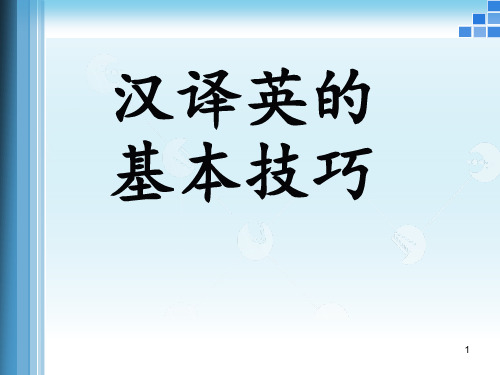
• To make a good plan ,prepare well and try to do some real test papers are advisible. • It is advisible to make a good plan ,prepare well and try to do some real test papers
3
2.突出句子的话题
主语和话题? 二者的语法性质和语义特征很不一样。主语在语法性质上是一个结构成 分,在语义上是行为动作的施动者。话题是句子其余部分的陈述对象。 “...,青少年犯罪现象才能得到根本解决。” 为了突出句子的话题,汉译英时可以选择话题作为译文的主语。
例1 茶的品种不同,制法也不同。
Tea differs in types and method of production.
15
(2)状语的位置的调整
汉语的句内语序:主+状+谓+宾,状语偶尔在句首 英语的句内语序:主+谓+宾+状 状语偶尔在句首或句中
例1 中国通过丝绸之路给西域各国带去了丝织物、火药和印刷术。
China brought silk, gunpowder, and printing techniques to the West via the Silk Road.
Square dancing is not allowed at the places intended for solemn activities. 8
2.增添主语
当汉语无主句较长,或存在多个宾语时,不太适合将其译为英语 被动句。理解句意,挖掘隐含主语,在译文中添加“we、one 、 you”等表泛指的代词来做主语,使译文成为结构完整、逻辑严谨的句 子。 例 1 中国历史上产生了许多杰出的哲学家、思想家、政治家、军事 家、科学家和文学艺术家,留下了浩烟如海的典籍。
2017年英语四级翻译答案

2017年12月(卷一)华山位于华阴市,据西安120公里。
华山就是秦岭得一部分,秦岭不仅分割陕南与陕北,也分隔华南与华北。
与从前人们常去朝拜得泰山不同,华山过去很少有人光临,因为上山得道路极其危险。
然而,希望长寿大人却经常上山,因为山上生长着许多草药,特别就是一些稀有得草药。
自上世纪90年代安装缆车以来,参观人数大大增加.Huashan(Mount Hua) is situated inHuayinCity,120kilometers away from Xi’an、Itis partof the QinlingMountains,which divides not onlySo uthern and NorthernShaanxi, but also South and North China、Unlike Taishan, which became a popular place of pilgrimage,Huashan was not well visited inthe pastbecause it is dangerous fortheclimbers toreach it ssummit、Huashanwasalsoan important placefrequentedby immortality seekers,as manyherbs grow there especiallysome r are ones、Since theinstallation of the cablecars in the1990s,the number of visitors has increased significantly、(卷二)泰山位于山东省西部。
海拔1500余米,方圆约400平方公里.泰山不仅雄伟壮观,而且就是一座历史文化名山,过去3000多年一直就是人们前往朝拜得地方。
据记载,共有72位帝王曾来此游览。
大学英语四级考试高频词汇2017修正版

一、大学英语四级考试高频词汇(2017 年修正版)['?:lt ?]v.改变,改动,更改['b?:st]vi.,n.忽然发生,爆裂[dis'p ?uz]vi.除掉;处理;解决;办理(of)[bl ɑ:st] n.爆炸;气流 vi.炸,炸掉[k?n'sju:m]v.耗费,耗尽[split] v.劈开;割裂;分裂 a.裂开的隔绝关系[spit]v.吐(唾液等);厌弃[spil]v. 溢出,溅出,倒出走漏风声[slip]v.滑动,滑落;忽视[slaid]v.滑动,滑落 n.滑动;滑面;幻灯片[b?k'ti?ri ?] n.细菌[bri:d]n.种,品种 v.生殖,产仔['b?d?it]n.估算 v.编估算,作安排['k?ndidit]n.候选人['k?mp ?s] n.校园['lib ?r?l] a.大方的;丰富的;自由的开通的[tr?ns'f ?:m] v.转变,改革;变换[tr?nz'mit] v.流传,播放;传达[tr?ns'pl ɑ:nt]v.移植[tr?ns'p ?:t] vt.运输,运送 n.运输,运输工具[?ift] v.转移;转动;转变['v??ri]v.变化,改变;使多样化['v?ni ?] vi.消灭,不见['sw?l?u] v.吞下,咽下 n.燕子[s?s'pi??n] n.思疑,怀疑(21英汉大字典同,查到大多数音标为[s?’spi??n])[s?'spi??s] a.思疑的,可疑的[maild] a.暖和的,暖和的;温柔的,味淡的['tend?] a.温柔的;柔弱的['nju:s ?ns] n.伤害,阻碍,厌烦(的人或事物)[,?ns?g'n?f?k?nt]a.无心义的,不足轻重的;无价值的[?k'sel ?reit]vt.加快,促进( 柯林斯英汉双解大辞典同,查到的大多数为[?k'sel?reit] )['?bs ?lju:t] a.绝对的,无条件的;完整的( 21世纪英汉大辞典同,查到的大多数 ['?bs ?lu:t])['baund?ri] n.分界限,界限[breik]n.刹车,制动器 v. 刹住(车)['k?t ?l?ɡ] n.目录(册) v.编目36.vague [vei ɡ] a.模糊的,不明确的[vein] n.白费,空费(与第 347 重复)[iks'ti? kt] a.绝灭的,熄灭的(21 世纪英汉大字典同,查到大多数[ik's ti? kt] )[iks'tr ?:dn?ri] a.不平时的,特其他,非凡的[iks'tri:m] a.极度的,极端的n.极端,过分(21 世纪英汉大字典同,查到大多数 [ik'stri:m]['eid ??nt] n.代理人,代理商;动因,原由['?lk ?,h?l] n.含酒精的饮料,酒精[?'pi:l] n./vi.号召,央求[iks'tr ?:dn?ri] [iks'tr ?:dn?ri] [iks'tr ?:dn?ri][?'pri: ?ieit] vt. 重视,赏识,赏识理解,增值[?'pru:v] v.同意,赞同,赞同['stimjuleit]vt.刺激,激励使活跃,使强健[?'kwai ?] vt.获得,得;学到[?'k?mpli ?] vt .达成,抵达;行['netw ?:k] n.网状物;广播网,网;网vt. 使(算机)网,成立人关系网,通(台或)网播出[taid] n.潮汐;潮流v. (尤指借某人)帮助⋯⋯. 渡关[' taidi] a.整的,整的vt. 使整、整理、整理[treis] vt.追踪,找到 n.印迹,踪影微量,少['t?:t??] n./vt.拷打,摧残54.wander ['w ?nd?]n/ vi.遨游,逛55.wax [w?ks]n.蜡 v. ⋯⋯打蜡[wi:v]v., n. 法;式[pri'z ?:v]v.保,保存,保持,持n. 果腌菜;有活;个人区61. abuse[?'bju:s]n/ v.用,凌虐;62. academic[,?k ?'demik] a.学的;高等院校的;研究院的n 大学教 .63. academy[?'k?d ?mi]n.(高等)科院校;学会64. battery['b?t ?ri]n.池()65. barrier['b?ri ?] n.阻碍;棚66. cargo['k ɑ:ɡ?u] n.(船、机等装的)物67. career[k ?'ri?] n.生涯,v. 猛冲、疾68. vessel['ves?l] n.船舶;容器,器皿;血管69. vertical['v ?:tik ?l] a.垂直的 n.垂直方向70. oblige[?'blaid ?] v.迫使,成;使感谢71. obscure[?b'skju ?] a.灰暗,模糊v. 搞混,使理解72. extent[ik'stent ] n.程度,范,大小,限度73. exterior[ik'sti ?ri ?] n.外面,表面 a. 外面的,表面的74. external[ik'st ?:nl] a.外面的,表面的,外面的75. petrol['petr?l] n.汽油76. petroleum[pi'tr ?uli ?m] n.石油77.delay [di'lei] vt./n.推,延,耽78.decay [di'kei] vi /n . 腐,腐败79. decent['di:s ?nt] a.像的,风光的80. route[ru:t] n.路;路;航81. ruin['ruin] v.坏,损坏 n., [pl.]墟82. sake[seik] n.故,原由清酒(一种日本米酒)83. satellite['s?t ?lait]n.星84. scale[skeil] n.大小,模;等;刻度v. 登攀85. temple['templ]n. 宇86. tedious['ti:di ?s] a.乏滋味,的,87. tend[tend] vi.易于,向88. tendency['tend?nsi] n. 向,89. ultimate['?ltimit] a.极端的,最大的,最的 n.极端(最好的⋯⋯)90. undergo[,?nd?'ɡ?u] v.,遭到91. abundant[?'b?nd?nt] a.丰富的,丰裕的,大批的92. adopt[?'d?pt] v. 收养;采纳;采93. adapt[?'d?pt] vi.适,合适;改,改写vt.使适94. bachelor['b?t ??l?] n.学士,学士学位;身95. casual['k? ?ju ?l] a.有时的,刚巧的;的;非正式的96. trap[tr?p] n.圈套,骗局 v.圈套捕获97. vacant['veik ?nt] a.空的,未占用的98. vacuum['v?kju ?m] n. 真空,真空吸尘器99. oral['?r?l] a. 口头的,口述的,口的n. 口试100. optics['?pt?ks] n.(单、复数同形)光学101. organ[' ?:ɡ?n] n.器官,风琴机关、机构102. excess['ekses] n.过分,过度,剩余 a. 过多的、剩余的103. expel[ik' spel] v.驱赶,开除,赶出104. expend[ik' spend] v. 花费105. expenditure[ik' spendit??] n.支出,花费;经费106. expense[ik' spens] n.开支,花费107. expensive[ik' spensiv] a. 花费多的;价钱尊贵的108. expand[ik' sp?nd] v.扩大,扩充;睁开,膨胀109. expansion[ik' sp?n ??n] n. 扩大,扩大;发展,膨胀110. private['praivit] a. 个人的,个人的n. 列兵、二等兵111. individual[,?ndi'vidju ?l]a.个其他,独自的 n. 个人,个体112. personal['p?:s?n?l] a.个人的,个人的;亲身的114. personnel[,p ?:s?'nel]n. [ 总称 ] 人员,职工;人事部门115. the Pacific Ocean[p?'s?f?k] [' ?u??n] 太平洋116. the Atlantic Ocean[?t'l?nt?k] 大西洋117. the Arctic Ocean[' ɑ:kt ?k, 'ɑ:t ?k] 北冰洋118. the Antarctic Ocean南冰洋119. grant[ɡrɑ:nt] vt.授与,赞同,准予n. 补贴金、拨款119.grand [ɡr?nd] a. 雄伟大,壮丽的,重要的120.invade [in'veid] v. 侵入,侵略,侵袭121.acid n.酸,酸性物质 a.酸的;尖刻的122. acknowledge[?k'n?lid ?] v.认可;道谢123. balcony['b?lk ?ni]n.露台(剧院的)楼座、楼厅124. calculate['k?lkjuleit]vt.计算,核算125. calendar['k?lind ?] n.日历,月历126. optimistic[,?pti'mistik] a.乐观的127. optional['?p??nl] a.能够任选的,非强迫的128. outstanding[,aut'st?ndi? ] a. 优秀的 , 突出的 , 明显的129. export['eksp?:t] n. 出口 ( 物 ) [ek'sp?:t] v. 出口 , 输出130. importt['imp ?:t] n.进口(物) v.进口,输入131. impose[im'p ?uz] vt.把 ...增强 (on);采纳,利用132. religion[ri'lid ??n] n.宗教,宗教崇奉133. religious[ri'lid ??s] a. 宗教的134. victim['viktim] n.牺牲品,受害者135. video['vidi ?u] n.电视,视频 a.电视的,录像的 v.录制136. videotape['v?di: ??,te?p] n. 录像磁带 v. 把... 录在录像带上137. offend[?'fend] v.冲犯,冲犯138. bother['b?e?] v.打扰,麻烦n. 麻烦139. interfere[,?nt?'fi ?] v. 干预,扰乱,阻碍140. internal[in't ?:n?l] a.内部的,国内的141. beforehand[bi'f ?:h?nd] ad.早先,早先142. racial['rei??l] a.人种的种族的143. radiation[,reidi'ei ??n] n.放射物,辐射144. radical['r?dik ?l] a. 根本的;激进的n. 激进分子145. range[reind ?] n.幅度,范围 v.(在某范围内)改动146. wonder['w ?nd?] n. 诧异 , 奇观 v.想知道 , 对 ...感觉迷惑147. isolate['ais?leit]vt.使隔绝,使孤立148. issue['isju:] n.问题,争辩点;刊行,(报刊)一期v. 发布、公布149. hollow['h?l?u] a.空的,中空的,空虚道n. 浅坑v. 使表面凹陷150. hook[huk] n.钩 vt.钩住151. adequate['?dikwit] a.合适地;足够152. adhere[?d'hi ?] vi.粘附,附着;恪守,坚持153. ban [b?n] vt.撤消,严禁154. capture['k?pt ??] vt.俘虏,捕获155. valid['v?lid] a.有效的,有依据的;正当的156. valley['v?li]n.山谷,峡谷157. consistent[k ?n'sist?nt] a.坚固的 ; 一致的 , 有始有终的158. continuous[k ?n'tinju ?s] a.连续的,连续(不停)的159. continual[k ?n'tinju ?l]a.不停地,屡次的160. explode[iks'pl ?ud] v.爆炸;迸发;激增161. exploit[iks'pl ?it]v.盘剥;利用,开采162. explore[iks'pl ?:] v.勘探163. explosion[iks'pl ?u??n] n.爆炸;迸发;激增164. explosive[iks'pl ?usiv] a.爆炸的;易惹起暴力的;极易惹起争辩的(未查到)n. 炸药、爆炸物质165. remote[ri'm ?ut] a.遥远的,荒僻的166. removal[ri'mu:v ?l] n.除掉,除去167. render['rend?] vt.使得,以致168. precaution[pri'k ?:??n] n.预防,防范,警惕169. idle['aidl] a.懒散的,无所作为的170. identify[ai'dentifai]vt. 认出,判定171. identify[ai'dentifai]n.身份;个性,特征172. poverty['p?v?ti] n.贫困173. resistant[ri'zist ?nt]a. (to)抵挡的 , 抗 ... 的,耐 ...的174. resolve[ri'z ?lv] vt.解决;决定,决意175. barrel['b?r ?l] n.桶176. bargain['b ɑ:ɡin] n.廉价货 vi.讲价还价177. coarse[k?:s] a. 粗的,粗拙的,粗劣的178. coach[k ?ut?] n.教练;长途公共汽车179. code[k?ud] n.准则,法例,密码180. coil[k?il] n.线圈 v.卷,环绕181. adult['?d ?lt]n.成年人182. advertise['?dv ?taiz] v. 为... 做广告183. advertisement[?d'v ?:tism ?nt] n.广告184. agency['eid??nsi] n.代理商,经销商185. focus['f ?uk ?s] v.(使)齐集 n.焦点,中心,聚焦186. forbid[f ?'bid]vt.不准,严禁187. debate[di'beit]n./v.争辩,争辩188. debt[det] n.负债189. decade['dekeid] n.十年190. enclose[in'kl ?uz] vt.围住;把 ... 装入信封191. encounter[in'kaunt ?] vt./n.遭受,受到192. globe[ɡl?ub] n.地球,世界;地球仪193. global['ɡl?ub?l ] a.全世界的;总的194.scan [sk?n] vt. 细看;扫描;阅读195.scandal ['sk?ndl] n. 丑事,丑闻196. significance[siɡ'nifik ?ns] n. 意义;重要性197. subsequent['s?bsikw ?nt] a. 随后的,以后的198. virtue['v ?:tju:]n.美德,长处199. virtual['v ?:tju ?l]a.本质上的,事实上的200. orient['?:ri ?nt] vt.使适应 ,(to,toward)使朝向 n. 东方201. portion['p?:??n] n.一部分202. target['tɑ:ɡit] n.目标,靶子 vt. 对准203. portable['p?:t?bl] a.手提式的204. decline[di'klain] v.拒绝,拒绝;降落205. illusion[i'lju: ??n] n.错觉206. likelihood n['laiklihud] .可能,可能性207. stripe[straip] n.条纹208. emphasize['emf ?saiz] vt.重申,侧重209. emotion[i'm ?u??n] n.感情,感情210. emotional[i'm ?u??nl] a.感情的,情绪(上)的211. awful[' ?:ful] a.极坏的,庄严的,可怕的212. awkward[' ?:kw ?d] a.蠢笨的,棘手的213. clue[klu:] n.线索,提示214. collision[k ?'li ??n] n. 碰撞,矛盾215. device[di'vais]n.装置,设备216. devise[di'vaiz]vt.发明,策划,想出217. inevitable[in'evit ?bl] a.不行防止的218. naval['neiv ?l] a.海军的219. navigation[,n?vi' ɡei??n] n. 航行220. necessity[ni'sesiti] n. 必需品必需性221. previous['pri:vi ?s] a.先,前,从前的222. provision[pr?'vi ??n]n.[pl.]给养 , 口粮 ; 准备 , 设备 , 装置223. pursue[p?'sju:] vt.追赶;追求;从事,进行224. stale[steil] a.不新鲜的,迂腐的225. substitute['s?bstitju:t] n. 代用品 vt. 取代226. deserve[di'z ?:v] vt.应受,应得,值得227. discrimination n[dis,krimi'nei ??n]. 鄙视;鉴识力228. professional[pr?'fe??n?l] a.职业的,特意的229. secure[si'kju ?] a.安全的,靠谱的230. security[si'kju ?riti]n.安全,保障231. scratch[skr?t ?] v./n.抓,搔,扒232. talent['t?l ?nt] n.才能,天资;人材233. insurance[in' ?u?r?ns] n.保险,保险费234. insure[in' ?u?] vt.给...保险,保证,保证235. nevertheless[,nev?e?'les] ad.仍旧,但是,可是236. neutral['nju:tr ?l] a.中立的,中性的237. spot[sp?t] n.地址;斑点 vt.认出,发现;玷辱238.spray [sprei] v. 喷,(使)溅散239.medium ['mi:dj ?m] a. 中等的 , 适中的 n. 媒介物 , 新闻媒介240. media ['mi:d I?] n.新闻传媒241. auxiliary[?:ɡ'zilj ?ri ] a.协助的,备用的242. automatic[,?:t?'m?tik] a.自动的243. compete[k ?m'pi:t]vi.竞争,竞赛244. competent['k?mpit?nt] a.有能力的,能胜任的245. competition[,k ?mpi'ti ??n] n.竞争,竞赛246. distribute[dis'tribju:t]vt.散发247. disturb[dis't ?:b] vt.打扰,阻碍248. infer[in'f ?:] v. 推论,推测249. integrate['inti ɡreit]v.(into,with)(使 ) 成为一体 ,( 使) 归并250. moist[m ?ist] a.湿润251. moisture['m?ist??] n.湿润252. promote[pr?'m?ut] vt.促进;提高253. region['ri:d ??n] n.地域;范围;幅度254. register['red?ist?] v./n.登记,注册255. stable['steibl] a.稳固的256. sophisticated[s?'fistikeitid] a. 老于世故的,干练的;很复杂的257. splendid a['splendid] .极好的,壮丽的,绚烂的258. cancel['k?ns ?l] vt.撤消,取销259. variable['v??ri ?bl] a.易变的,可变的260. prospect['pr?spekt] n.远景,前程;情景261. prosperity[pr?s'periti]n. 兴盛,繁华( 21 世纪英汉大辞典同,查到大多数为[pr?’ s'periti] )262. aspect['?spekt] n.方面;朝向;相貌263. cope[k?up] vi. (with)(成功地)对付,办理264. core[k?:] n. 果心,中心265. maintain[mein'tein]vt.保持,保持;坚持,主张266. mainland['meinl ?nd] n. 大陆267. discipline['disiplin]n.纪律;处罚;学科268. domestic[d?'mestik]a.本国的 , 国内的 ; 家用的 ; 家庭的269. constant['k ?nst?nt] a.不变的,恒定的 n. 常数270. cliff[klif]n. 绝壁,峭壁271. authority[?:' ?riti]θn.威望;当局272. audio[' ?:di?u] a.听觉273. attitude['?titju:d]n.态度274. community[k ?'mju:niti]n.社区,社会275. commit[k?'mit] vt.犯(错误,罪状等),干(坏事等)276. comment['k ?ment] n./vt.议论277. distinguish[dis'ti? ɡwi ?] vt.划分,鉴识278. distress[dis'tres]n.难过,伤心 vt.使难过279. facility[f?'siliti]n. [pl.]设备,设备;便利,方便280. faculty['f?k ?lti] n. 能力 , 技术 ; 系 , 学科 , 学院 ; 全体教员281. mixture['mikst ??] n.混淆,混淆物282.mood [mu:d] n. 心情,情绪;语气283.moral ['m?r?l] a. 道德上的,有道德的284. prominent['pr ?min?nt] a.突出的285. substance['s?bst?ns] n.物质;本质286. substantial[s?b'st?n ??l] a.可观的;坚固的;本质的287. prompt[pr ?mpt]vt.促进 a.矫捷的,实时的288. vivid['vivid] a.生动的289. vocabulary[v ?'k?bjul ?ri]n.词汇(量);词汇表290. venture['vent ??] n.风险投资 , 风险项目 v.冒险 ; 取于291. version['v ?:??n] n.版本,译本; 292. waist[weist] n. 腰,腰部293. weld[weld] v./n.焊接294. yawn[j ?:n] vi.打哈欠295. yield[ji:ld] vi. (to)折服于;让出,放弃 n.产量296. zone[z?un] n.地域,地区297. strategy['str?tid ?i] n.战略,策略298. strategic[str ?'ti:d ?ik] a.战略(上)的,要点的299. tense[tens] a.紧张的 v.拉紧 n.时态300. tension['ten??n]n.紧张(状态),张力301. avenue['?v ?nju:]n.林荫道,大街302. available[?'veil ?bl] a.现成可用的;可获得的303. comparable['k?mp?r?bl] a. (with,to)可比较的 , 近似的304. comparative[k ?m'p?r ?tiv]a. 比较的,相对的305. dash[d? ?] vi.猛冲,飞驰306. data['deit ?] n.数据,资料307. dive[daiv] vi.跳水,潜水308. diverse[dai'v ?s] a.不一样的,多种多样的309. entitle[in'taitl]vt.给 ...权益,给 ... 资格310. regulate['reɡjuleit]vt.管理,调理311. release[ri'li:s] vt./n.开释,排放;解说解脱312. exaggerate[i ɡ'z?d ??reit] v. 夸张,夸张313. evil['i:v ?l] a.险恶的,坏的314. shrink[?ri ?k] vi.起皱,缩短;退却315. subtract[s?b'tr?kt]v.减(去)316. suburb['s?b?:b] n.市郊317.subway ['s?bwei] n. 地铁318.survey [s?'vei] n./vt.检查,勘察319. wealthy['wel θ i]a.富饶的320. adjust[?'d??st] v.调整,调理321. attach[?'t?t ?] vt.系,贴;使隶属322. profit['pr?fit] n.收益,好处; v.有利于,有利于323. profitable['pr?fit ?bl] a.有利可图的324. slope[sl ?up] n.斜坡,斜面325. reinforce[,ri: ?n'f?:s] vt.增强,增强326. reject[ri'd ?ekt]vt.拒绝327. fatal['feit ?l] a.致命的;重要的328. fate[feit] n.命运329. humble['h?mbl] a.谦虚的;谦虚的330. illegal[i'li: ɡ?l ] a.不合法的,非法的331. award[?'w?:d] vt.授与,判给 n.奖品,奖金332. aware[?'w??] a.意识到333. column['k ?l?m] n.柱,圆柱;栏,专栏334. comedy['k ?midi]n.喜剧335. dumb[d?m] a. 哑的;缄默的愚笨的336.dump [d?mp] vt. 倾卸,倾倒337.deaf [def] a. 聋的;不肯听的338. decorate['dek?reit] vt.装修,装璜339. principal['prins ?p?l] a.最重要的n.负责人,校长340. principle['prins ?pl] n.原则,原理341. prior['prai ?] a.优先的,在前的342. priority[prai' ?riti] n.优先,要点343. prohibit[pr?'hibit] vt.严禁,严禁347. vain[vein] a.白费的,无效的348.undertake [,?nd?'teik] vt. 肩负,着手做;赞同,答应349.unique [ju:'ni:k] a. 独一的,独到的350. obstacl e ['?bst?kl] n.阻碍(物),阻碍351.odd [?d] a. 奇异的,怪异的;奇数的352. omit[? u'mit] vt.省略353. opponent[?'p?un?nt] n.敌手,敌手354. opportunity[,?p?'tju:niti]n. 机遇,机遇355. orchestra['?:k ?,stre?t] n.管弦乐队356. semester[si'mest?] n.学期;半年357. semiconductor[,semik ?n'd?kt?] n. 半导体358. seminar['seminɑ:] n.商讨会359. terminal['t?:min ?l] a.尾端的,极限的 n.终点360. territory['terit ?ri] n.国土361. approximate[?'pr?ksimit] a. 大体的,大概 v.近似362. arbitrary['ɑ:bitr ?ri] a.任意的,独断的363. architect['ɑ:kitekt]n.建筑师364. architecture['ɑ:kitekt ??]n.建筑学365. biology[bai' ?l?d?i] n.生物学366. geography[d?i'?ɡr?fi] n.地理(学)367. geology[d?i'?l?d?i] n.地质学368. geometry[d?i'?mitri]n.几何(学)369. arithmetic[?'riθm?tik]n.算术370. algebra['?ld ?ibr?] n.代数371. entertainment[,ent?'teinm?nt]n. 娱乐;款待,款待372. enthusiasm[in'θju:zi?z?m] n.热忱,热情373. entry['entri] n.进入,进口处;参赛的人(或物)374. environment[in'vai ?r?nm?nt] n. 环境375. episode['epis?ud] n.插曲,片段376. equation[i'kwei ??n] n.方程(式)377. restrain[ris'trein] vt.阻挡,克制378. restraint[ris'treint]n.克制,限制379. resume[ri'zju:m]v.(中止后)从头开始380. severe[si'vi ?] a.严重的381. sexual['seksju?l]a.性的382. simplicity[sim'plisiti]n.简单;朴实383. simplify['simplifai]vt.简化384. sorrow['s?r?u] n.悲痛,沉痛385. stuff[st?f] n.原料,资料 vt.填进,塞满386. temporary['temp?r?ri] a.暂时的,暂时的387. temptation[temp'tei ??n] n. 迷惑,引诱388. terror['ter?] n.恐惧389. thrust v[ θr?st].挤,推,插390. treaty['tri:ti] n.合约,协议391. arise[?'raiz] vi.产生,出现,发生;起身392. arouse[?'rauz] vt.惹起,激起;唤醒393. burden['b?:d?n] n.重任,负荷394. bureau['bju ?r?u] n.局,做事处395. marvelous[?mɑ?v?l?s] a.奇观般的,惊人的396. massive ['m?siv] a.大的,大批的,大块的397. mature [m?'tju ?] a.成熟的398.maximum ['m?ksim ?m] a. 最高的,最大的399.minimum ['minim ?m] a. 最低的,最小的400. nonsense['n?ns?ns] n.乱说,莽撞的行动401. nuclear['nju:kli?] a.核子的,核能的402. nucleus['nju:kli?s] n.核403. retail['ri:teil] n./[ri:'teil] v./ad.零售404. retain[ri'tein] vt.保存,保持405. restrict[ris'trikt]vt.限制,拘束406. sponsor['sp?ns?] n.倡始者,主办者vt. 倡始,主办,资助407. spur [sp?:] n./vt.刺激,激励408. triumph['trai ?mf] n.成功,成功409. tuition[tju'i ??n] n.学费410. twist[twist]vt.使环绕;转动;扭歪411. undergraduate[,?nd?'ɡr?djuit] n. 大学肄业生412. universal[,ju:ni'v ?:s?l] a.广泛的,通用的;宇宙的413. universe['ju:niv ?:s] n.宇宙414. via['vai ?] prep.经由,经过,经过415. vibrate[vai'breit]v.振动,摇晃416. virus['vai ?r?s] n.病毒417. voluntary['v?l?nt?ri] a.自发的418. volunteer[,v ?l?n'ti?] n.志愿者 v. 自发(做)419. vote[v?ut] v.选举 n.选票420. wagon['w? ɡ?n] n.四轮马车,铁路货车421. appoint[?'p?int] vt.委任,委派422. approach[?'pr?ut?] v.凑近,凑近 n.门路,方式423. appropriate[?'pr?upriit]a.合适的424. bunch[b?nt?] n.群,伙;束,串425. bundle['b?ndl] n.捆,包,束 vt. 采集,归拢426. ceremony['serim ?ni] n.典礼,仪式427. chaos['kei ?s] n.杂乱,杂乱428. discount['diskaunt]n.(价钱)折扣429. display[dis'plei] ay n./vt.陈设,展览430. equivalent[i'kwiv ?l?nt] a.相等的 n.相等物431. erect[i'rekt] a.竖直的 v.建筑,直立432. fax[f?ks] n./vt.传真433. fertile['f ?:tail] a.肥饶的;多产的434. fertilizer['f ?:tilaiz ?]n.肥料435. grateful['ɡreitful] a.感谢的436. gratitude['ɡr?titju:d] n. 感谢437. horror['h?r?] n.恐惧438. horrible['h?r?bl] a.可怕的439. Internet['int ?net] n.国际互联网,因特网440. interpret[in't ?:prit] v.翻译,解说441. interpretation[,?nt?:pri'tei ??n] n.解说,说明442. jungle['d???ɡl] n.森林,密林443. knot[n?t] n.结vt.把...打成结444.leak [li:k] v. 漏,溢出445.lean [li:n] vi. 倾斜,倚,靠446.leap [li:p] vi. 跳跃447. modify['m?difai]vt.改正448. nylon['nail ?n] n.尼龙449. onion[' ?nj?n] n.洋葱450. powder['paud?] n.粉末451. applicable['?plik ?bl] a.可应用的,合适的452. applicant['?plik?nt] n. 申请人453. breadth[bred θ]n.宽度454. conservation[,k?ns?'vei ??n] n.保存,保护455. conservative[k?n's?:v?tiv] a.守旧的456. parallel['p?r ?lel] n. 平行线;可对比较的事物457. passion['p? ??n] n.激情,热忱458.passive ['p?siv] a. 被动的,悲观的459.pat [p?t] v./n. 轻拍,轻打460.peak [pi:k] n. 山岳,极点461.phenomenon [fi'n ?min?n] n. 现象462. reluctant[ri'l ?kt ?nt] a.不宁愿的,牵强的463. rely[ri'lai] vi. (on ,upon)依靠,盼望464. relevant['rel?v?nt] a.相关的,贴题的465. reliable[ri'lai ?bl] a. 靠谱的466. relief[ri'li:f] n. 轻松,欣慰;减少467. reputation[,repju'tei ??n] n. 名气,名誉468. rescue['reskju:] vt./n.救援469. triangle['trai?? ɡl] n.三角(形)470. sequence['si:kw ?ns] n.连续;次序471. shallow[' ??l ?u] a.浅的472. shiver['?iv ?] vi/n.发抖473. shrug[?r?ɡ] v./n.耸肩474. signature['si ɡnit ??] n. 署名475. sincere[sin'si ?] a.真挚的,真挚的476. utility[ju'tiliti]n.功用,功效477. utilize['ju:tilaiz]vt. 利用478. utter[' ?t?] vt.说出 a.完整的,完全的479. variation[,v ??ri'ei??n] n.变化,改动480. vehicle['vi: ?kl]n.交通工具,车辆481. applause[?'pl?:z] n.鼓掌,掌声482. appliance[?'plai?ns] n. 用具,器材483. consent[k ?n'sent] n. 允许,赞同 vi (to)允许,赞同484. conquer['k ??k?] vt.征服485. defect[di'fekt] n.弊端,缺点486. delicate['delikit] a.易碎的;娇弱的;精巧的487. evolve[i'v ?lv] v. 演变488. evolution[,i:v ?'lu:??n] n.演变,进化489. frown[fraun] v./n.皱眉490. frustrate['fr ?streit]vt.使丧气491. guarantee[, ɡ?r ?n'ti:] vt./n.保证492. guilty['ɡilti] a.愧疚的;有罪的493. jealous['d?el?s] a.忌妒的494. jeans[d?i:nz]n.牛仔裤495. liquor['lik ?] n.酒,烈性酒['li:t ?]/['li:t?] n. 升497. modest a['m ?dist] .谦虚的498. molecule['m?likju:l]n.分子499. orbit[' ?:bit] n.轨道 v.(绕 ...)作轨道运转500. participate[pɑ:'tisipeit]v. (in)参加,参加501. particle['p ɑ:tikl]n.微粒502. particularly[p?'tikjul ?li] ad.特别,特别503. respond[ri'sp?nd] vi.回答,回复;反响504. response[ri'sp?ns] n.回答,回复;反响505. sensible['sens?bl] a.理智的506. sensitive['sensitiv] a.敏感的,敏捷的507. tremble['trembl]vi.发抖508. tremendous[tri'mend ?s] a. 巨大的;出色的509. trend[trend]n.趋势,偏向510. trial['trai ?l]n.审问;试验511. apparent[?'p?r ?nt] a.明显的,理解的512. appetite['?pitait]n.胃口;欲念513. deposit[di'p ?zit]n.存款,定金 v. 寄存,积蓄514. deputy['depjuti]n.副职,代表515. derive[di'raiv]vt.获得,获得; (from) 发源于516. descend[di'send] v.下来,降落517. missile['misail] n.导弹518. mission['m??(?)n] n.使命;代表团519. mist[mist] n. 薄雾520. noticeable['n?utis?bl]a.不言而喻的521. notify['n?utifai]vt.通知,见告522. notion['n?u??n] n.观点;企图,想法523. resemble[ri'zembl]vt.像,近似于524. reveal[ri'vi:l]vt.揭穿525. revenue['rev ?nju:]n.收入,岁入;税收526. shelter[' ?elt?] n.遮蔽处;住处527. shield[?i:ld]n.防范物,盾 vt.保护,防范528. vital['vait ?l] a.重要的;致命的,生命的529. vitally['va ?t?li]ad.极度,特别;致命地530. urban[' ?:b?n] a.城市的531. urge[?:d?] vt.鼓舞,激励532. urgent['?:d??nt] a.迫切的,紧迫得533. usage['ju:zid ?] n.使用,用法534. violence['vai ?l?ns] n.强力,暴力535. violent['vai ?l?nt]a.强暴的536. violet['vai?lit] a.紫色的537. weed[wi:d] n.杂草,野草538. welfare['welf ??] n.福利539. whatsoever[,hw ?ts??'ev?, ,hw?t-, ,w ?t, ,w ?t-] ad.( 用于否认句)任何540. whereas[hw ??r'?z] conj.但是,可是,只管541. essential[i'sen??l] a.必不行少的;本质的542. estimate['estimeit] n./vt.预计,估计543. evaluate[?'v?lj ?'et]/ [ ?'v?lj ?e?t]vt. 评估,议论544. exceed[ik'si:d]vt.超出,越出545. exceedingly[ik'si:di? li]ad.特别,极其546. exclaim[iks'kleim]v.呼叫,高声说547. exclude[iks'klu:d]vt.把 ... 排挤在外,不包含548. exclusive[iks'klu:siv] a.读有的,排他的549. excursion[iks'k ?:??n] n.远足550. flash[fl? ?] vi.闪光,闪烁551. flee[fli:]vi.逃脱552. flexible['fleks ?bl] a.易曲折的553. flock[fl ?k] n.羊群,(鸟兽等)一群;一伙人554. hardware['h ɑ:dw??] n.五金用具555. harmony['h ɑ:m?ni ] n.和睦,和睦556. haste[heist] n.急速,赶忙557. hatred['heitrid]n.厌恶,仇恨558. incident['insid ?nt] n.事件,事变559. index['indeks]n.索引,标记560. infant['inf ?nt]n.婴儿561. infect[in'fekt]v.传染562. inferior[in'fi ?ri?] a. 低等的,次的,下级的563. infinite['infinit] a.无穷的564. ingredient[in' ɡri:dj ?nt ] n.构成部分565. inhabitant[in'h?bit?nt] n.居民566. jail[d?eil] n.牢狱567. jam [d??m] n.果酱;拥堵,拥塞568. jewel['d?u:?l] n. 宝石569. joint[d??int] a. 连结的;共同的570. junior['d?u:nj?] a.年少的;资历较浅的571. laser['leiz ?] n.激光572. launch[l ?:nt?] vt.发动,倡始573. luxury['l?k??ri] n.豪侈;豪侈品574. magnet['m? ɡnit] n.磁铁,磁体575.male [meil] a. 男性的,雄的576.female ['fi:meil] a. 女性的,雌的577.manual ['m?nju ?l] a. 用手的,手工做的 n. 手册578. manufacture[,m?nju'f?kt ??] vt./n.制造,加工579. marine[m?'ri:n] a.海的;海产的580. mutual['mju:t ?u?l]a.互相的581. naked a['neikid] .裸露的582. negative['neɡ?tiv] a.否认的,悲观的583. neglect[ni' ɡlekt] vt.忽视,忽视584. origin['?rid?in]n.发源,身世585. oval ['?uv ?l] a.椭圆形的 n.椭圆形586. outset['autset] n.开始,初步587. presumably[pri'zju:m ?bli] ad.大体,可能588. prevail[pri'veil]vi.流行,流行589. quit[kwit] v. 停止590. quotation[kw ?u'tei??n] n.引文,引语591. recreation[,rekri'ei ?n] n.娱乐活动592. recruit[ri'kru:t]vt.招募593. rival['raiv ?l] n.竞争敌手,敌手594. shuttle[' ??tl]/ [' ??t(?)l] n.梭子;航天飞机595.skim [sk?m] vt. 搬(去),掠过;阅读596.sketch n [sket ?]. 草图;梗概597.slender ['slend ?] a. 苗条的,修长的598.theme [ θ i:m]n. 主题599.textile ['tekstail] n. 纺织品600.tropical ['tr ?pik?l] a. 热带的,酷热的601.kneel [ni:l] vi. 跪bel ['leib ?l] n. 标签603. merchant['m?:t??nt] n.商人604. mere[mi ?] a. 只是的,只可是的;纯粹的605. nuisance['nju:s?ns] n.令人厌烦的东西(或人)606. numerous ['nju:m ?r ?s] a.众多的,很多的607. parade[p?'reid] n.游行 v.排队前进608. pants[pl.][p?nts]n.长裤;内裤609. partial['p ɑ:??l ] a. 部分的610. passport['p ɑ:sp?:t] n.护照611. prescribe[pri'skraib] vt.开药,嘱咐采纳 ...疗法612. primitive['primitiv] a.原始的,初期的613. ridge[rid ?] n.脊,山脊,埂614. ridiculous[ri'dikjul?s] a.可笑的615. rigid['rid ?id] a.严格的;僵直的616. withstand[wie 'st?nd] vt.经受,蒙受617. witness['witnis]n.目睹者;凭证 vt.注意到;证明618. withdraw[wie 'dr?:] v.回收,撤除619. slippery['slip ?ri] a. 滑的620. smash[sm? ?] vt.粉碎,打烂621. snap n[sn?p] ./vt.折断,拉断;快照622. software['s?ftw ??] n.软件623. solar['s?ul?] a.太阳的624. lunar['lju:n ?] a.月的,月球的625.submerge [s?b'm?:d?] vi. 潜入水中626.submit [s?b'mit] vi.(to) 折服,遵从627. timber['timb ?] n.木材,原木628. tissue['tisju:]n.组织;薄纱,手巾纸629. title['taitl] n.题目,标题630. tone[t?un] n.语气,音调631. drift[drift]vi.漂,漂流632. drip[drip]n.滴633. durable['dju ?r?bl] a. 耐用的,长久的634. duration[dju ?'rei??n] n.连续,连续期635. dusk [d?sk] n.傍晚,黄昏636. leather['lee ?] n.皮革637. legislation[,led?is'lei ??n] n. 法律,法例;立法638. leisure['le??] n. 空暇;安闲639. loose[lu:s] a.松的,宽松的640. loosen['lu:s ?n] v. 解开,放松641. tarnish['t ɑ:n??] v.失掉光彩,败坏,生锈642. earthquake['?: θkweik]n. 地震643. echo['ek?u] n.回音,回声644. elaborate[i'l?b ?reit] a.精心设计的,复杂的645. elastic[i'l?stik] n. 橡皮圈(带) a. 有弹性的646. elbow['elb ?u] n. 肘647. electron[i'lektr ?n] n.电子648. volcano[v ?l'kein ?u] n.火山649. volume['v ?lju:m] n.卷,册;体积,容量650. fatigue[f ?'ti: ɡ] n.疲惫,劳苦651. faulty['f?:lti] a. 有错误的,有弊端的652. favorable['feiv ?] a.夸赞道;有利的,顺利的653. favorite['feiv ?] a.特别受喜爱的654. gallery[' ɡ?l ?ri ] n.画廊655. gallon['ɡ?l ?n] n. 加仑656. gap [ɡ?p] n.间隔,差距657. garbage[' ɡɑ:bid?] n.垃圾,废物658. gaze[ ɡeiz] v.凝望,凝视659. gear[ ɡi?] n.齿轮,传动装置660. gene[d?i:n] n.基因661. lest[lest] conj.生怕,省得662. liable['lai ?bl] a.可能的,大体的; (to)易于 ...的663. liberal['lib ?r ?l] a.自由得664. liberty['lib ?ti]n.自由665. licence /license['lais ?ns] n. 允许证,执照666. moisture['m?ist??] n.湿润667. motivate['m?utiveit] vt.激励,激发668. motive['m?utiv]n.动机,目的669. generate['d?en?reit] vt.生成,产生(光、热、电等)670. genius['d?i:nj ?s] n.天才,天分671. genuine['d?enjuin] a.真的,真挚的672. gasoline['ɡ?s?li:n] n.汽油673. germ[d??:m] n.微生物,细菌674. gesture['d?est??] n. 姿势,手势675. giant['d?ai?nt] a.巨大的 n. 巨人676. glimpse[ɡlimps] n.一瞥,一看677. glory[' ɡl?:ri ] n.荣耀,荣誉678. glorious['ɡl?:ri?s] a 荣耀的,极好的679. golf[ ɡ?lf ] n.高尔夫球运动680. hydrogen ['haidr ?d??n] n. 氢681. oxygen['?ksid??n] n. 氧682. hostile['h?stail] a.敌对的,敌意大683.household ['haush?uld] n. 家庭,户684.hook [huk] n. 钩685.holy ['h?uli] a. 神圣地,圣洁的686. hint[hint] n.表示,表示687. hesitate['heziteit] v.踌躇688. highlight['hailait] vt.重申,突出689. hence[hens] ad. 所以,所以;此后,此后690. herd[h?:d] n.兽群,牧群691. deliberately adv.成心的692. attraction n.吸引,吸引力693. destructive adj.损坏性的694. starvation n.饥饿,饿死695. exhaustion n.全力,疲倦696. strike n.停工 v. 打击,停工697. strength n.力量,力气698. await vt.等待699. deportation n.放逐700. identification n.鉴识,证明。
英语四级真题阅读翻译2017年12月第二套
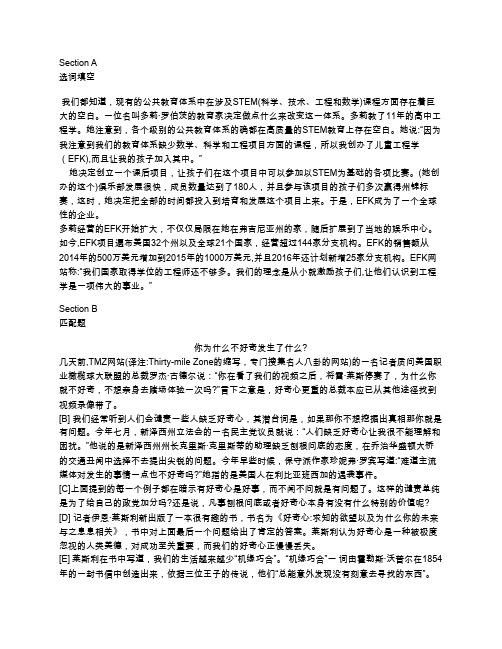
Section A选词填空我们都知道,现有的公共教育体系中在涉及STEM(科学、技术、工程和数学)课程方面存在着巨大的空白。
一位名叫多莉·罗伯茨的教育家决定做点什么来改变这一体系。
多莉教了11年的高中工程学。
她注意到,各个级别的公共教育体系的确都在高质量的STEM教育上存在空白。
她说:“因为我注意到我们的教育体系缺少数学、科学和工程项目方面的课程,所以我创办了儿童工程学(EFK),而且让我的孩子加入其中。
”她决定创立一个课后项目,让孩子们在这个项目中可以参加以STEM为基础的各项比赛。
(她创办的这个)俱乐部发展很快,成员数量达到了180人,并且参与该项目的孩子们多次赢得州锦标赛,这时,她决定把全部的时间都投入到培育和发展这个项目上来。
于是,EFK成为了一个全球性的企业。
多莉经营的EFK开始扩大,不仅仅局限在她在弗吉尼亚州的家,随后扩展到了当地的娱乐中心。
如今,EFK项目遍布美国32个州以及全球21个国家,经营超过144家分支机构。
EFK的销售额从2014年的500万美元增加到2015年的1000万美元,并且2016年还计划新增25家分支机构。
EFK网站称:“我们国家取得学位的工程师还不够多。
我们的理念是从小就激励孩子们,让他们认识到工程学是一项伟大的事业。
”Section B匹配题你为什么不好奇发生了什么?几天前,TM Z网站(译注:T hirty-mile Zone的缩写,专门搜集名人八卦的网站)的一名记者质问美国职业橄榄球大联盟的总裁罗杰·古德尔说:“你在看了我们的视频之后,将雷·莱斯停赛了,为什么你就不好奇,不想亲身去赌场体验一次吗?”言下之意是,好奇心更重的总裁本应已从其他途径找到视频录像带了。
[B] 我们经常听到人们会谴责一些人缺乏好奇心,其潜台词是,如果那你不想挖掘出真相那你就是有问题。
今年七月,新泽西州立法会的一名民主党议员就说:“人们缺乏好奇心让我很不能理解和困扰。
四级翻译英语听力:茅盾谈直译,顺译,歪译
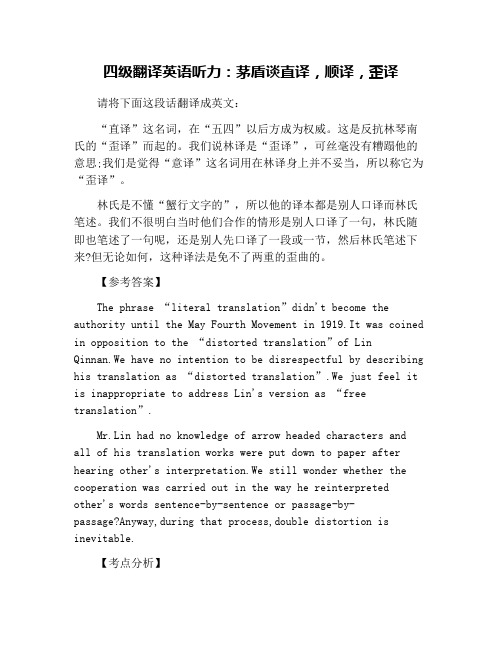
四级翻译英语听力:茅盾谈直译,顺译,歪译请将下面这段话翻译成英文:“直译”这名词,在“五四”以后方成为权威。
这是反抗林琴南氏的“歪译”而起的。
我们说林译是“歪译”,可丝毫没有糟蹋他的意思;我们是觉得“意译”这名词用在林译身上并不妥当,所以称它为“歪译”。
林氏是不懂“蟹行文字的”,所以他的译本都是别人口译而林氏笔述。
我们不很明白当时他们合作的情形是别人口译了一句,林氏随即也笔述了一句呢,还是别人先口译了一段或一节,然后林氏笔述下来?但无论如何,这种译法是免不了两重的歪曲的。
【参考答案】The phrase “literal translation”didn't become the authority until the May Fourth Movement in 1919.It was coined in opposition to the “distorted translation”of Lin Qinnan.We have no intention to be disrespectful by describing his translation as “distorted translation”.We just feel it is inappropriate to address Lin's version as “free translation”.Mr.Lin had no knowledge of arrow headed characters andall of his translation works were put down to paper after hearing other's interpretation.We still wonder whether the cooperation was carried out in the way he reinterpretedother's words sentence-by-sentence or passage-by-passage?Anyway,during that process,double distortion is inevitable.【考点分析】1.“直译”这名词,在“五四”以后方成为权威。
- 1、下载文档前请自行甄别文档内容的完整性,平台不提供额外的编辑、内容补充、找答案等附加服务。
- 2、"仅部分预览"的文档,不可在线预览部分如存在完整性等问题,可反馈申请退款(可完整预览的文档不适用该条件!)。
- 3、如文档侵犯您的权益,请联系客服反馈,我们会尽快为您处理(人工客服工作时间:9:00-18:30)。
2017年大学英语四级翻译复习--茅盾请将下面这段话翻译成英文:
茅盾是中国最优秀的著名现代小说家之一。
他最著名的作品是《子夜》(Midnight)。
茅盾还在上小学时就已经开始发展他的写作技巧。
当他在杭州读中学时,广泛的阅读和严格的写作技能培训充满了他的生活。
期间他读完了大量的古典小说。
这些小说影响了他的写作风格和创作理念。
茅盾于1913年进入北京大学提供的为期三年的基础学校,在那里他研究了中国和西方文学。
参考翻译:
Mao Dun is one of the best, famous modern novelistsin China.His most famous work is Midnight.Mao Dunhad already started to develop his writing skills whenhe was still in primary school.While he was studyingin secondary school in Hangzhou,extensive readingand strict writing skills training filled his life.During that time, he finished reading a largenumber of classical novels which influenced his writing style and creating ideas.Mao Dunentered the three-year foundation school offered by Peking University in 1913,in which hestudied Chinese and Western literature.
1.当他在杭州读中学时,广泛的阅读和严格的写作技能培训充满了他的生活:“广泛的”可译为extensive, “广泛的阅读”为extensive reading。
“严格的”可译为strict, bestrict with意为对...要求严格。
充满可译为fill,同义词组还有be full of。
2.他读完了大量的古典小说:“读完”可用英语常用的结构finish+v-ing。
“大量的”因其修饰的为可数名词“小说”,故可译为
a large number of。
“古典小说”可译为classical novels。
3.这些小说影响了他的写作风格和创作理念:“影响”可译为动词influence,也可译为词组have the hifluenceon。
英语中表示影响的词语还有名词effect,动词affect,词组have effect on。
